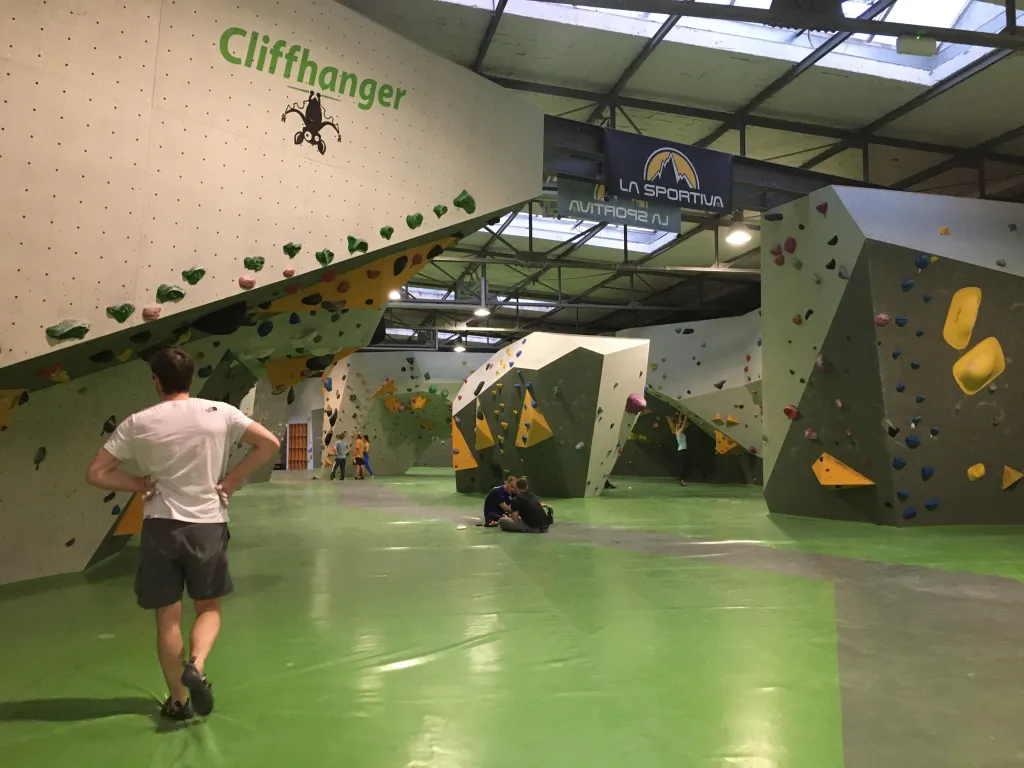John Jang
· 5 mn to read
Physical training and language learning
Is going to the gym and bouldering related to language learning?
This blog article breaks the foray into language hack, but I think you will enjoy it just the same. I’m writing this from Berlin where I was recently invited to go indoor bouldering for the first time and I’m glad to say I found it very satisfying. Since it had so many similarities to what Pengguin eventually wishes to offer, I had to write something about it. It’s normal to get burnt out in language learning and yet it doesn’t have to be. I think the language learning community can learn something or two from bouldering.
A little about Bouldering from my brief experience: it’s an exercise where you start off the ground with two hands on the starting rock(s). Each “course” is complete when you reach the top. The difficulty of each course is marked by colours or numbers so that you have a reasonable expectation of whether you will reach the top, and you can track your progress.
When deciding to follow my new friend to the bouldering centre, my expectation was similar to that of visiting a new gym. The aim was to get a workout in, and indeed it was a workout, but bouldering was so much more. Both the gym and bouldering provides you with immediate feedback regarding your abilitites. You can either bench your weight or not, and you will find out immediately by trying it. It’s the same in bouldering, the feedback regards how far you can make it towards the top. Smashing your personal best in bench press is satisfying and so is reaching the top in bouldering after multiple attempts. It’s a process of trial and error where the satisfaction is literally tangible.

Trial and error is the process by which one improves in bouldering. With the help of a trainer you can get some important tips and try out the manoeuvres . You can also learn a lot simply by observing the more experienced climbers. In starting out with language learning, you need to grasp some basic concepts and practise putting together a few phrases with the new grammatical notions and vocabulary acquired. Just as indoor bouldering provides a safe environment to where you can practice and improve incrementally towards your goal of mastery.
The bouldering centre had a soft mattress-like floor to soften the landing when jumping down and to ensure a safer fall. There were many times when I almost lost my grip and I saw a number of people falling off the walls and landing on their backs. No one laughs at anyone who falls because everyone has been there; everyone at the bouldering cerntre has either fallen off or have been extremely close to falling. This is why speaking practise in a controlled space is a good environment to test your skills. The danger of embarrassment is mitigated because everyone is learning.
On the other hand, the reality of “danger” makes the challenge extra exciting. Social engagement in the lagnauge you have een learning is a challenge. There is the danger that you will get stuck midway when trying to express something. Mixing up words and saying something ridiculous is part and parcel of language learning! I’ve seen this happen with a German friend who during a ceremonious dinner farewelling him responded with, “I’ve really appreciated your hostility” instead of “hospitality”. The room burst out with laughter. It was all in good spirits as everyone liked him. However, I’ve made a similar mistake when speaking up in theology class among German natives, and for better or worse, there was no laughter, just a simple, “Alright then, as we were saying…” Talk about embarrassing!
The benefit of a controlled enviornment of immersion is simply that: you are in more control. There’s less repercussions for errors, and your journey to fluency can progress steadily along realistic expectations. Yet immersion implies the conversation with native speakers and other learners is still real, which is to say there is still opportunity to make a fool of oneself. The challenge of the arena makes it just that much more exciting.
After controlled immersion, spending time writing down and revising what you learnt will help you master that aspect of the language. This is like working on a particular aspect of your body so that you can grow as a boulderer. For example, you can work on flexibility and strength at the gym. For language learniers, it’s helpful to work on weak spots through flash-cards and grammar revision. However, if you don’t engage in immersion experiences, you may not know what language skills you are lacking in.
The social element was also something I didn’t expect. At a regular gym, most people are in-and-out doing their daily exercise with their ear-phones in. I have admired some pretty epic squats by others at the gym, but bouldering was far more social in an interesting way. Even if one is climbing on his or her own, anyone can observe. I found it entertaining to watch others climb. Bouldering is the display of flexibility, agility, intelligence and expertise. Not to say it’s all about flexing, but it can be quite a show. Gathering together to practice has this benefit. To admire and to learn from each other. Pengguin is building a language community, where respect and safety are highly respected. With time, we can help each other pick up skills, work towards fluency and survive any language learning blues! More on that next time. For now, enjoy flexing your language skills!